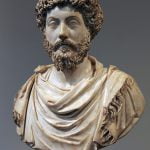The term “romanization” refers to the dissemination of Roman culture and the Latin language in the areas conquered by the Romans. This process had a dominant influence on the shape of Western Civilization. Romanization played an important role in the life of every inhabitant because identification with the Roman state could facilitate his career and life itself. The Romans never imposed their culture by force, it was always a voluntary act. Persecutions of Christians and Jews may be considered as exceptions here.
Latin was used in the Roman Empire. It was a new language, and at the same time so interesting that it became the native language of the Romans. Along with the territorial development of the Roman state, the scope of Latin also increased, which in a short time became the second language (after Greek) of the Mediterranean region.
An element of romanization was also the policy of granting civic rights. Obtaining this title gave the opportunity for social promotion to the equestrian and then senatorial status. In 212 CE the Roman emperor Caracalla granted citizenship to all free inhabitants of the Empire.
The period of the Empire was a time of increased romanization of newly conquered areas. More and more local cultures began to identify with Roman culture. The cult of the emperor in the principate, the common religion in the Dominate, as well as the common language and Latin language, are not without significance here.
First, northern Italy was subjected to romanization. The reach of Roman culture, however, was intensively developed due to the Punic Wars. The western part of the empire was most romanized, inhabited mostly by barbarian peoples. The eastern part took over Greek culture, and the inhabitants of this region did not know Latin. The civilization of the east of the Roman Empire was also characterized by greater intellectualism and a more mystical type of religiosity than Roman civilization, which further hindered the romanization of these areas. The exception is the areas directly adjacent to Greece, where according to the dominant theory Romanians come from. This region is still inhabited by Romance peoples who speak the dialects of the Aromatic language.
Also, many areas of the West, especially wild and peripheral ones, have not been romanized. This mainly applies to northern Spain (Basques), Britain and northern Gaul, where the Celtic population prevailed in the countryside for a long time.
The romanization process had great importance for the functioning of the Roman state. Romanization integrated the state and connected residents in a common fate. It aroused a sense of belonging to the country. Residents identified with the culture and beliefs of Rome, thus confirming their loyalty. Probably it was this factor that determined the long existence of the state.







